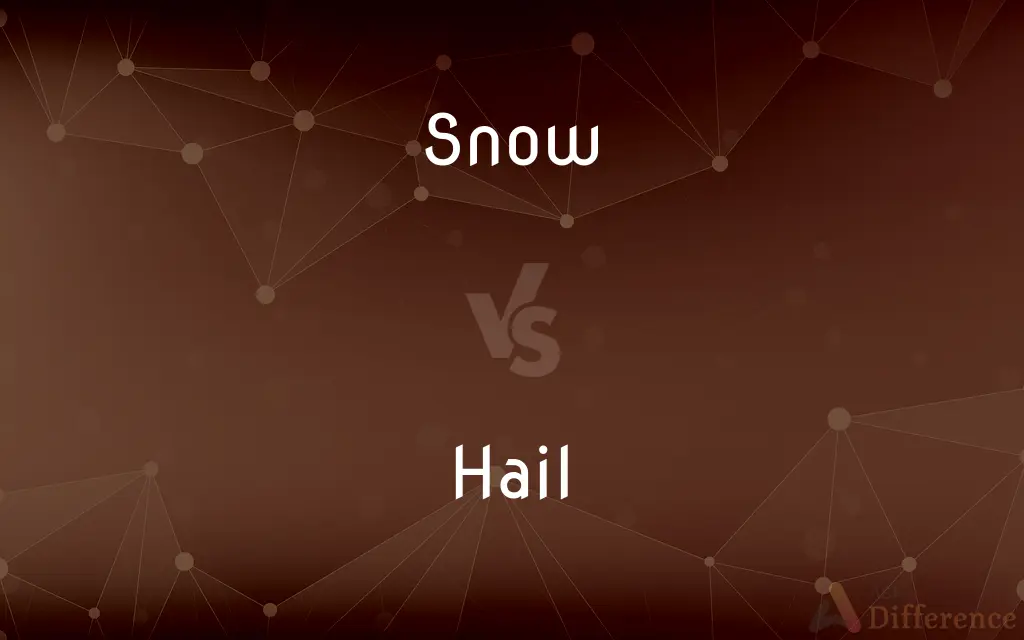Snow vs. Hail — What's the Difference?
By Fiza Rafique & Urooj Arif — Updated on March 24, 2024
Snow is a form of precipitation composed of ice crystals that softly accumulates, typically at temperatures below freezing. Hail, on the other hand, is solid precipitation in form of ice balls or lumps, forming during thunderstorms with strong updrafts.

Difference Between Snow and Hail
Table of Contents
ADVERTISEMENT
Key Differences
Snow forms in cold clouds through the sublimation of water vapor into ice crystals, which then cluster together to fall as snowflakes. It occurs when the air temperature is at or below freezing from the cloud down to the ground, resulting in a soft, fluffy precipitation that gently accumulates on surfaces. Hail is produced during thunderstorms when updrafts lift raindrops into extremely cold areas of the atmosphere, freezing them into balls of ice. These ice balls can cycle within the storm, gathering layers of ice before they become too heavy and fall to the ground as hailstones.
The texture and impact of snow versus hail are significantly different. Snow, being composed of delicate ice crystals, blankets the landscape in a soft layer that can range from powdery to wet, depending on the temperature and humidity conditions. Hail, consisting of hard, frozen lumps, can cause damage to crops, vehicles, and structures due to its density and the force with which it falls.
Snow is generally associated with winter weather and colder climates, where it can accumulate over time, creating winter landscapes and requiring removal from roads and walkways. Hail is more associated with specific storm conditions and can occur in a variety of climates, including those that are relatively warm, as long as the conditions aloft are suitable for its formation.
The formation of snow promotes activities like skiing and snowboarding and has a significant impact on water resources, as accumulated snowpacks slowly release water during warmer months. Hail, while less frequent, poses challenges for agriculture, aviation, and property insurance due to its potential for destruction.
Culturally, snow is often associated with tranquility, winter holidays, and recreational sports, while hail is typically seen as a destructive force, a hazard to be protected against during severe thunderstorms.
ADVERTISEMENT
Comparison Chart
Composition
Ice crystals clustered together
Balls or lumps of ice
Formation
In cold clouds, through sublimation
In thunderstorms with strong updrafts
Texture
Soft and fluffy
Hard and solid
Impact
Gentle accumulation, promotes winter activities
Can cause damage to crops, vehicles, structures
Occurrence
Cold weather, winter months
During thunderstorms, various climates
Cultural Associations
Winter holidays, tranquility
Seen as destructive, hazardous
Compare with Definitions
Snow
Precipitation of ice crystals forming fluffy accumulations.
The city was blanketed in snow overnight, transforming it into a winter wonderland.
Hail
Can damage crops and property.
Farmers assessed the extensive damage to crops after the hail.
Snow
Associated with tranquility and holidays.
Snow during the holidays adds to the festive atmosphere.
Hail
Forms during thunderstorms with strong updrafts.
The intense updrafts in the storm caused large hailstones to form.
Snow
Promotes winter sports and activities.
The fresh snow is perfect for skiing and snowboarding today.
Hail
Solid precipitation in the form of ice balls.
The sudden hailstorm left dents in cars and damaged roofs.
Snow
Requires removal from pathways.
Heavy snowfall necessitated extensive shoveling of sidewalks.
Hail
Occurs in a variety of climates.
Despite the warm weather, the conditions were right for a brief hailstorm.
Snow
Essential for water resources in some regions.
The mountain's snowpack provides vital water supply in the spring.
Hail
Viewed as a hazard during storms.
The weather service issued a warning for potential hail damage.
Snow
Snow comprises individual ice crystals that grow while suspended in the atmosphere—usually within clouds—and then fall, accumulating on the ground where they undergo further changes. It consists of frozen crystalline water throughout its life cycle, starting when, under suitable conditions, the ice crystals form in the atmosphere, increase to millimeter size, precipitate and accumulate on surfaces, then metamorphose in place, and ultimately melt, slide or sublimate away.
Hail
Hail is a form of solid precipitation. It is distinct from ice pellets (American English "sleet"), though the two are often confused.
Snow
Atmospheric water vapour frozen into ice crystals and falling in light white flakes or lying on the ground as a white layer
We were trudging through deep snow
Hail
Precipitation in the form of spherical or irregular pellets of ice larger than 5 millimeters (0.2 inch) in diameter, usually associated with thunderstorms.
Snow
A mass of flickering white spots on a television or radar screen, caused by interference or a poor signal
All that they could pick up on their screens was snow
Hail
Something that falls with the force and quantity of a shower of ice and hard snow
A hail of pebbles.
A hail of criticism.
Snow
A dessert or other dish resembling snow
Vanilla snow
Hail
The act of greeting or acclaiming.
Snow
Cocaine.
Hail
A shout made to catch someone's attention or to greet.
Snow
Snow falls
It's not snowing so heavily now
Hail
Hailing distance
Told me to stay within hail.
Snow
Mislead or charm (someone) with elaborate and insincere words
They would snow the public into believing that all was well
Hail
To precipitate in pellets of ice and hard snow.
Snow
Frozen precipitation consisting of hexagonally symmetrical ice crystals that form soft, white flakes.
Hail
To fall like hailstones
Condemnations hailed down on them.
Snow
A falling of snow; a snowstorm.
Hail
To pour (something) down or forth
They hailed insults at me.
Snow
The white specks on a television screen resulting from weak reception.
Hail
To salute or greet.
Snow
(Slang) Cocaine.
Hail
To greet or acclaim enthusiastically
The crowds hailed the boxing champion.
Snow
(Slang) Heroin.
Hail
To call out or yell in order to catch the attention of
Hail a cabdriver.
Snow
To fall as or in snow.
Hail
To signal or call to a passing ship as a greeting or identification.
Snow
To cover, shut off, or close off with snow
We were snowed in.
Hail
Used to express a greeting or tribute.
Snow
(Slang) To overwhelm with insincere talk, especially with flattery.
Hail
S or pieces of ice falling as precipitation, often in connection with a thunderstorm.
Snow
(uncountable) The frozen, crystalline state of water that falls as precipitation.
Hail
An occurrence of this type of precipitation; a hailstorm.
Snow
(uncountable) Any similar frozen form of a gas or liquid.
Hail
A rapid, intense barrage by a large number of projectiles or other objects.
Snow
(countable) A snowfall; a blanket of frozen, crystalline water.
We have had several heavy snows this year.
Hail
(impersonal) Of hail, to fall from the sky.
They say it's going to hail tomorrow.
Snow
(uncountable) A shade of the color white.
Hail
(intransitive) To send or release hail.
The cloud would hail down furiously within a few minutes.
Snow
(uncountable) The moving pattern of random dots displayed on a television, etc., when no transmission signal is being received.
Hail
To pour down in rapid succession.
Snow
Cocaine.
Hail
(transitive) To greet; give salutation to; salute.
Snow
Marine snow
Hail
(transitive) To name; to designate; to call.
He was hailed as a hero.
Snow
A two-masted, square-rigged vessel, trysail-mast stepped immediately abaft the main mast.
Hail
(transitive) To call out loudly in order to gain the attention of.
Hail a taxi.
Snow
(impersonal) To have snow fall from the sky.
It is snowing.
It started to snow.
Hail
To indicate, from a designated stop or otherwise, to the driver of a public transport vehicle that one wishes to board and travel on the vehicle, usually using hand signals such as waving.
In Melbourne, you would usually have to hail a tram when you are travelling late at night and there are no other passengers waiting at your stop.
Snow
(colloquial) To hoodwink someone, especially by presenting confusing information.
Hail
(transitive) To signal in order to initiate communication with.
Snow
(poker) To bluff in draw poker by refusing to draw any cards{{cite-book
Hail
(obsolete) Healthy, whole, safe.
Snow
A square-rigged vessel, differing from a brig only in that she has a trysail mast close abaft the mainmast, on which a large trysail is hoisted.
Hail
An exclamation of respectful or reverent salutation, or, occasionally, of familiar greeting.
Snow
Watery particles congealed into white or transparent crystals or flakes in the air, and falling to the earth, exhibiting a great variety of very beautiful and perfect forms.
Hail
Small roundish masses of ice precipitated from the clouds, where they are formed by the congelation of vapor. The separate masses or grains are called hailstones.
Thunder mixed with hail,Hail mixed with fire, must rend the Egyptian sky.
Snow
Fig.: Something white like snow, as the white color (argent) in heraldry; something which falls in, or as in, flakes.
The field of snow with eagle of black therein.
Hail
A wish of health; a salutation; a loud call.
The angel hail bestowed.
Snow
To fall in or as snow; - chiefly used impersonally; as, it snows; it snowed yesterday.
Hail
To pour down particles of ice, or frozen vapors.
Snow
To scatter like snow; to cover with, or as with, snow.
Hail
To pour forcibly down, as hail.
Snow
Precipitation falling from clouds in the form of ice crystals
Hail
To call loudly to, or after; to accost; to salute; to address.
Snow
A layer of snowflakes (white crystals of frozen water) covering the ground
Hail
To name; to designate; to call.
And such a son as all men hailed me happy.
Snow
English writer of novels about moral dilemmas in academe (1905-1980)
Hail
To declare, by hailing, the port from which a vessel sails or where she is registered; hence, to sail; to come; - used with from; as, the steamer hails from New York.
Snow
Street names for cocaine
Hail
To report as one's home or the place from whence one comes; to come; - with from.
Snow
Fall as snow;
It was snowing all night
Hail
Healthy. See Hale (the preferable spelling).
Snow
Conceal one's true motives from especially by elaborately feigning good intentions so as to gain an end;
He bamboozled his professors into thinking that he knew the subject well
Hail
An exclamation of respectful or reverent salutation, or, occasionally, of familiar greeting.
Hail
Precipitation of ice pellets when there are strong rising air currents
Hail
Enthusiastic greeting
Hail
Praise vociferously;
The critics hailed the young pianist as a new Rubinstein
Hail
Be a native of;
She hails from Kalamazoo
Hail
Call for;
Hail a cab
Hail
Greet enthusiastically or joyfully
Hail
Precipitate as small ice particles;
It hailed for an hour
Common Curiosities
Can both snow and hail provide water resources?
Snow is a more significant source of water through snowmelt, while hail melts quickly and contributes less to long-term water supplies.
Why does snow fall softly while hail falls hard?
Snow is composed of light, delicate ice crystals, while hail is made of dense ice, causing it to fall with more force.
Why is hail associated with destruction?
Hailstones, particularly large ones, can cause significant damage to anything they strike due to their density and velocity.
What role does snow play in ecosystems?
Snow insulates the ground, protecting plants and wildlife from extreme cold, and gradually releases water in spring, supporting rivers and habitats.
What determines the size of hailstones?
The size is determined by the strength of the updrafts in a thunderstorm and how long the hailstone circulates within the storm, gathering layers of ice.
Can hail occur in summer?
Yes, hail can occur in any season if thunderstorm conditions with strong updrafts are present.
Is snow always a peaceful phenomenon?
While often seen as peaceful, heavy snowfall can cause disruptions, such as traffic problems and structural collapses.
How do people protect against hail damage?
Strategies include using protective coverings for cars and crops, building hail-resistant roofs, and staying informed about weather conditions.
How is hail damage measured?
Hail damage is often assessed by the size of hailstones, the duration of the hailstorm, and the vulnerability of the surfaces impacted.
Does the presence of snow affect climate?
Yes, snow-covered areas can reflect sunlight, influencing local and regional temperatures and weather patterns.
Share Your Discovery

Previous Comparison
Sweet vs. Bitter
Next Comparison
Composition vs. ComprehensionAuthor Spotlight
Written by
Fiza RafiqueFiza Rafique is a skilled content writer at AskDifference.com, where she meticulously refines and enhances written pieces. Drawing from her vast editorial expertise, Fiza ensures clarity, accuracy, and precision in every article. Passionate about language, she continually seeks to elevate the quality of content for readers worldwide.
Co-written by
Urooj ArifUrooj is a skilled content writer at Ask Difference, known for her exceptional ability to simplify complex topics into engaging and informative content. With a passion for research and a flair for clear, concise writing, she consistently delivers articles that resonate with our diverse audience.















































